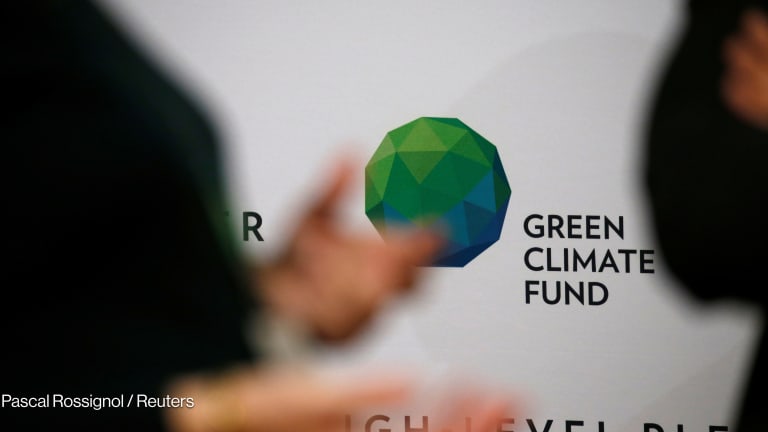
KATOWICE, Poland — At its February board meeting, the Green Climate Fund will take up reforms that could streamline the accreditation process — a step representatives from accredited African institutions say is much needed. At the same time, accredited partners are strengthening their own efforts to support other African institutions looking to join climate financing funds, particularly GCF.
Created by the United Nations Framework Convention on Climate Change in 2010, GCF was designed to support developing countries in their efforts both to mitigate and adapt to climate change. That allows it to fund a greater diversity of projects than other funding mechanisms that are focused only on specific types of responses. GCF also takes on larger scale projects than many of its counterparts: The Adaptation Fund, for instance, has a $10 million funding cap per country, while GCF can issue much more financing in the form of grants, loans, equity, or guarantees.
“The requirements do not reflect institutional and operational realities in least-developed countries.”
— Zerihun Getu, Ethiopian Ministry of Finance and Economic Cooperation officialAccessing that financing and getting those projects started, however, has been difficult, representatives from African countries who have been through the process told Devex. While any developing country that is a UNFCCC member is eligible for GCF resources, that money must be secured through one of the direct-access entities.
Securing that status “is a process which is fraught with difficulties,” said Déthié Soumaré Ndiaye, the manager of the climate finance unit at the Dakar-based Centre de Suivi Ecologique. The semi-autonomous public utility was the first African institution to register with GCF. “It requires a lot of time and effort.”
Zerihun Getu, an official with Ethiopia’s Ministry of Finance and Economic Cooperation, described a years-long process that required the involvement of officers from across the government. His ministry secured direct-access status at the beginning of 2016.
“The requirements do not reflect institutional and operational realities in least-developed countries,” he said during a panel discussion on accessing GCF funding at the ongoing COP24 climate negotiations in Katowice, Poland. Panel members pointed to items such as codes of ethics, environmental risk analyses, and gender-sensitive programming, which they had to scramble to create during the accreditation process. “It’s rigorous, time-consuming, and takes resources,” Zerihun said. “You have to mobilize a team of experts.”
Zenebou Aw, whose community-level investment agency in Mali just completed its GCF application this month, said the process was useful in helping her team build out its capacity and become more professional. Having gone through the process, she said, “we should be able to source other international and climate financing.”
While Ndiaye understands GCF’s need to ensure its money is well spent by institutions that meet its standards, he said the process also means there are not as many GCF-funded projects underway as there might be if accreditation were simplified or designed to make it easier for developing-country institutions to have access. “This does not reflect the spirit of the convention,” he said.
Proposed changes
GCF officials said they are aware of these concerns, and steps that might help alleviate them will be discussed and potentially adopted at the upcoming board meeting.
“It’s quite broad looking, taking a look at the framework from a policy standpoint and framework standpoint, whether that is lending itself to the ultimate target, which is to develop direct access,” Stephanie Kwan, GCF’s senior accredited entities specialist, told Devex. Those changes would encompass efforts to prioritize accreditation of direct-access entities and private sector partners, specifically. They would also provide pathways to accreditation that are tailored to the kind of institution that is applying — one of the problems Zerihun highlighted as part of his ministry’s application process.
“It would streamline the process, making it more flexible and tailored to each of the different kinds of institutions, because we’re able to work with a wide variety of organizations,” Kwan said.
Simon Wilson, GCF’s head of communications, said there was also a proposal to create project-specific accreditation, which would allow organizations to be approved on a one-off basis.
At the same time, there are increasing official efforts — both from GCF and others — to support informal channels of support that have sprung up among developing country institutions to ease the accreditation process.
There are the straightforward efforts: Zerihun and Ndiaye said they regularly provide support for other institutions and ministries that are going through the application process. They are looking for funds that will help them increase these efforts.
What is missing, Ndiaye said, are some basic tools that could prove a huge help to applicants — instructions in different languages and local experts who have been through the process and are available to assist institutions with their applications. He also called for regularly, formalized meetings of direct access institutions to give feedback to GCF and other financing instruments about their experiences.
Read more from COP24:
►The key role of indigenous people in global climate change efforts
► Why the World Bank decided against an emissions target
► Engineers sound alarm about climate change and infrastructure
Money is increasingly available for just these kinds of initiatives. The African Development Bank’s Africa Climate Change Fund provides money for them, among other initiatives. The ACCF, which made its second call for proposals last year, currently funds eight projects. That will likely include efforts such as training trainers and supporting greater collaboration between applicants and accredited institutions, said Louise Brown, who coordinates the ACCF.
“We want to shape our support in a way that responds to the needs identified by entities,” she said.
GCF is also looking to boost its support for these efforts. The board is also set to consider an initiative known as Readiness 2.0, building on an existing program that prepares countries to launch climate change strategies. That can include helping institutions get ready for the accreditation process.








